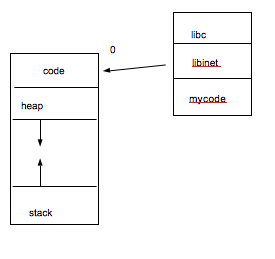Difference between revisions of "Operating Systems 2014F Lecture 7"
(Created page with "Modern systems do not do static linking, instead they do dynamic linking. - fPIC ASLR dynamic linking at compile time - insert stubs at runtime - mmap libraries - updat...") |
|||
| Line 2: | Line 2: | ||
- fPIC | - fPIC | ||
[[File:Addressingandseg1.png]] | |||
ASLR | ASLR | ||
| Line 12: | Line 14: | ||
- mmap libraries | - mmap libraries | ||
- update tables | - update tables | ||
Wonder what system calls happen when I run a statically linked version of the program. Multithreaded support, there are some system calls that happen, no matter what that's there to set the thread state, even if your program isn't multithreaded. Complicated. Key things in the tutorial today: looking in the face of some of this complexity. ok what does the assembly look like. What does the object code look like, what is this linking that happens? Do expect you to understand a couple of key bits, and why it is all there. The main idea here is dynamic linking. | |||
One real benefit of having a library being loaded dynamically, it will be mapped into different addresses, and different address spaces for different processes. You might have 100 copies, how many copies of the c library is loaded into memory. When you mmap a file into one process, and you mmap it into another process, it doesn't take any additional memory. The data is the same. The position in memory will be different for different processes. That's when you talk about shared libraries. We are talking about shared in memory. THat means you can have these very big libraries loaded in. Only the parts of the library that are loaded are those that are referenced. The other part is stored on disk. As a user space programmer you don't have to worry about this. If you do low level programming, you will see segments. | |||
Why do we have this model of how the program works? Somehow it's historic. Forget this whole virtual address space. We are doing the redirection inside the address space. Why don't we just access the physical memory. You could still keep things separate. That's not how most of the code we have that expects how the world to work. It's done, now it runs all the code. | |||
Revision as of 09:17, 26 September 2014
Modern systems do not do static linking, instead they do dynamic linking.
- fPIC
ASLR
dynamic linking at compile time
- insert stubs
at runtime - mmap libraries - update tables
Wonder what system calls happen when I run a statically linked version of the program. Multithreaded support, there are some system calls that happen, no matter what that's there to set the thread state, even if your program isn't multithreaded. Complicated. Key things in the tutorial today: looking in the face of some of this complexity. ok what does the assembly look like. What does the object code look like, what is this linking that happens? Do expect you to understand a couple of key bits, and why it is all there. The main idea here is dynamic linking.
One real benefit of having a library being loaded dynamically, it will be mapped into different addresses, and different address spaces for different processes. You might have 100 copies, how many copies of the c library is loaded into memory. When you mmap a file into one process, and you mmap it into another process, it doesn't take any additional memory. The data is the same. The position in memory will be different for different processes. That's when you talk about shared libraries. We are talking about shared in memory. THat means you can have these very big libraries loaded in. Only the parts of the library that are loaded are those that are referenced. The other part is stored on disk. As a user space programmer you don't have to worry about this. If you do low level programming, you will see segments.
Why do we have this model of how the program works? Somehow it's historic. Forget this whole virtual address space. We are doing the redirection inside the address space. Why don't we just access the physical memory. You could still keep things separate. That's not how most of the code we have that expects how the world to work. It's done, now it runs all the code.
